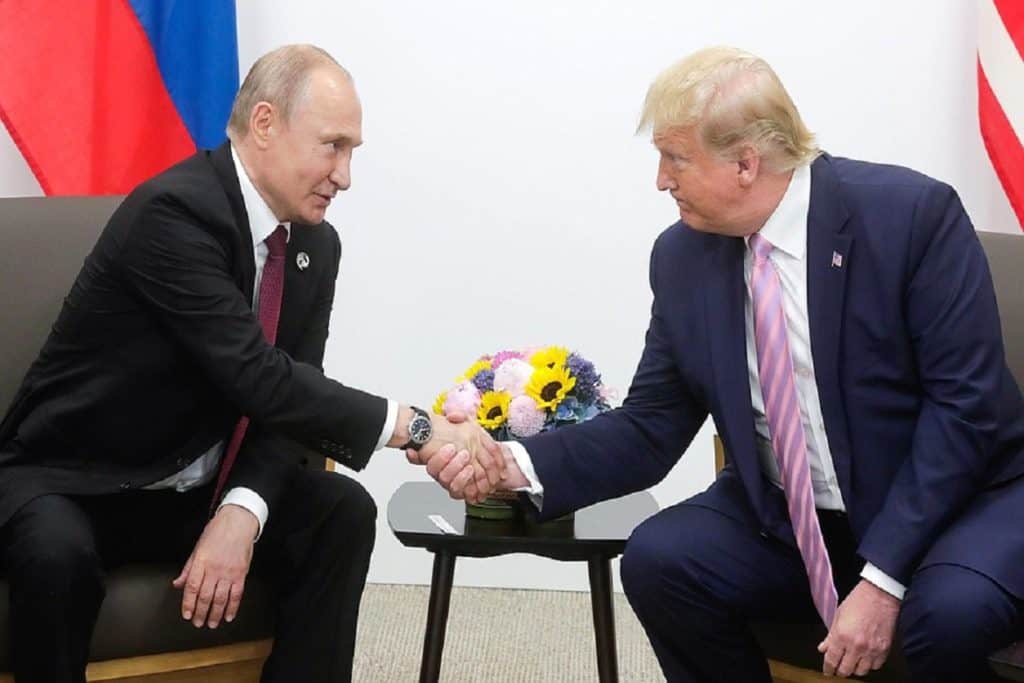By Anton Evstratov
Relations between the Russian Federation and the United States have now reached the lowest possible level in terms of their level, which dictates the need for their improvement, albeit insignificant.
Admittedly, the leaders of Russia and the United States, their relationship is currently experiencing its worst time ever. If Vladimir Putin on June 23 pointed to the permanent degradation of bilateral cooperation with the United States, Donald Trump noted the need and the possibility of improving it. At the same time, in 2018, after the meeting of two leaders in Helsinki, the American president called bilateral relations of that time the worst since they were established at the beginning of the XIX century.
Indeed, at present, the United States and the Russian Federation are diverging not only on most issues of bilateral relations, but also on major world problems. The situation around Iran looks permanently tense. If the United States increasingly and unsuccessfully increases the pressure of sanctions, the consequences of which have already become a paralysis of the inflow of foreign currency to Iran and a strong decline in the standard of living of the population. Russia, on the contrary, is Tehran’s key economic partner.
Moscow, which is itself under similar restrictions from Europe and the United States, cannot alleviate the economic consequences of US sanctions for Iran, but it provides its partner with reasonable political support.
Directly connected, as with Iran, and with the Russian-American tension and the Syrian problem. On the one hand, the United States, through the mouth of Donald Trump, refused to have a direct military presence in this country. On the other, they continue on the diplomatic plane, firstly to support the Syrian democratic forces east of the Euphrates, and also, they are wary of Russia’s attempts , Iran and the Syrian government to eliminate Idlib boiler.
The situation is aggravated and complicated by the presence of the Turkish factor in Syria, which largely caused the very presence of the Idlib boiler, as well as other areas of influence of Turkey in the north of the country.
The problem of disarmament is no less difficult for Russia-US bilateral relations. It seems that the question, which was closed as a whole in Soviet times, became relevant again after Moscow ended Russia’s participation in the Cold War-era Intermediate-range Nuclear Forces Treaty (INF), after the United States first announced it would abandon the deal. The INF agreement for the elimination of medium-range and shorter-range missiles was signed in 1987 between the USSR and the USA, for the complete destruction of ground-based basing the average (1,000–5,500 km) and shorter (500–1,000 km) ranges, and the refusing to produce and test them. The contract was signed personally by presidents R. Reagan and M. Gorbachev.
In this part, the expiration of another document, START-3 (the treaty on the reduction of arsenals of strategic nuclear weapons signed in 2010 between Russia and the USA) is relevant. It is the next step in the START-1 (1991) and START-2 (1993) agreements. ) in 2021. On this issue, the parties have not even started negotiations yet – largely due to mutual misunderstanding on key issues.
Also obviously different positions of the United States and the Russian Federation in Ukraine and Georgia. If in the first coming to power of the new President Vladimir Zelensky should be the reason for the next round of the struggle of Moscow and Washington for influence, the Georgian unrest after the controversial behavior of Deputy Gavrilov looks more like a much more radical struggle of local political forces.
At the same time, the second case can be viewed as an example of confrontation with respect to the loyal Russia party of the “Georgian Dream” and the uniquely pro-American supporters of former President Mikhail Saakashvili and the forces that joined them.
Both politicians and experts agree that, since relations between Moscow and Washington have reached the lowest possible level. The two nuclear powers can not afford to further deteriorate. Accordingly, the next stages should come, albeit insignificant – but improvement.
Such parallels have occurred in history before – in particular, some warming between the USSR and the United States after the “Caribbean crisis”, which put the world on the brink of nuclear war.
And there are prerequisites for improving relations between Russia and the United States. First, the current paradigm does not fully suit either of the parties. If the United States, partly at the request of Donald Trump, partly for objective reasons, lost much of its influence in the Middle East and Central Asia and worsened relations and deepened contradictions with Europe.
The Russians, imposed by sanctions, began to live worse. The leaders of both countries understand both of them, which explains their recent statements regarding the coming warming. Trump frankly promised improvements, then Putin expressed his country’s readiness for such an outcome and even stipulated the possibility of waiting for the corresponding decision of Washington.
We should not forget that in 2020 the next presidential elections will be held in the United States, which the current president may lose. His opponents from the Democratic Party at the moment have different views on relations with Russia, but it is obvious that in the case of re-election, the US foreign policy, including in this part, will be revised.
At the same time, Trump, wanting to stay for a second term, will act on the foreign policy arena as carefully as possible, as any aggravation with serious consequences or, especially, a conflict situation, or open opposition will reduce his chances of re-election to zero.
(The views expressed in this article belong only to the author and do not necessarily reflect the views of World Geostrategic Insights)
Image Credit en.kremlin.ru







